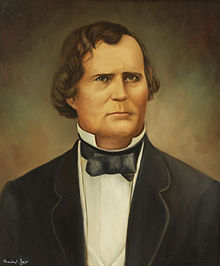Madison S. Perry
| Madison Starke Perry | |
|---|---|
 |
|
| 4th Governor of Florida | |
|
In office October 5, 1857 – October 7, 1861 |
|
| Preceded by | James E. Broome |
| Succeeded by | John Milton |
| Member of the Florida Senate | |
|
In office 1850 |
|
| Member of the Florida House of Representatives | |
|
In office 1849 |
|
| Personal details | |
| Born | 1814 Lancaster County, South Carolina |
| Died |
(aged 50–51) Rochelle, Florida |
| Political party | Democratic |
| Spouse(s) | Martha Peay Starke |
| Military service | |
| Allegiance |
|
| Service/branch |
|
| Years of service | 1861–63 |
| Rank |
|
| Unit |
|
Madison Starke Perry (1814 – March 1865) was the fourth Governor of Florida.
Madison Starke Perry was born in Lancaster County, South Carolina, the youngest child of Benjamin Perry and his wife Mary Starke. He came to Florida in 1845 and helped found the village of Rochelle, Florida in Alachua County. He became a leader among the plantation owners in Alachua County and was elected to represent the county in the Florida House of Representatives in 1849. The following year he was elected to the Florida Senate.
Perry ran for and was elected governor in 1856, assuming office on October 5, 1857. As Florida's fourth governor, Perry helped bring about the settlement of a long-standing boundary dispute with Georgia and encouraged the building of railways in the state. During the years before the Civil War, Governor Perry foresaw the possibility that Florida might secede from the Union, and in 1858 he urged the reestablishment of the state’s militia. Florida did secede three years later, on January 10, 1861. Perry then called for the evacuation of all federal troops from Florida, intending to replace them with the militia.
After his term as governor ended on October 7, 1861, Perry served as colonel of the 7th Florida Infantry Regiment until illness forced his resignation on April 30, 1863. He retired to his plantation in Rochelle, where he died in March 1865, shortly before the end of the American Civil War. Survived by his wife and two children, he was buried in Oak Ridge Cemetery in Rochelle.
The city of Perry, Florida is named in his honor. The city of Starke, Florida may have been named in his honor.
...
Wikipedia
